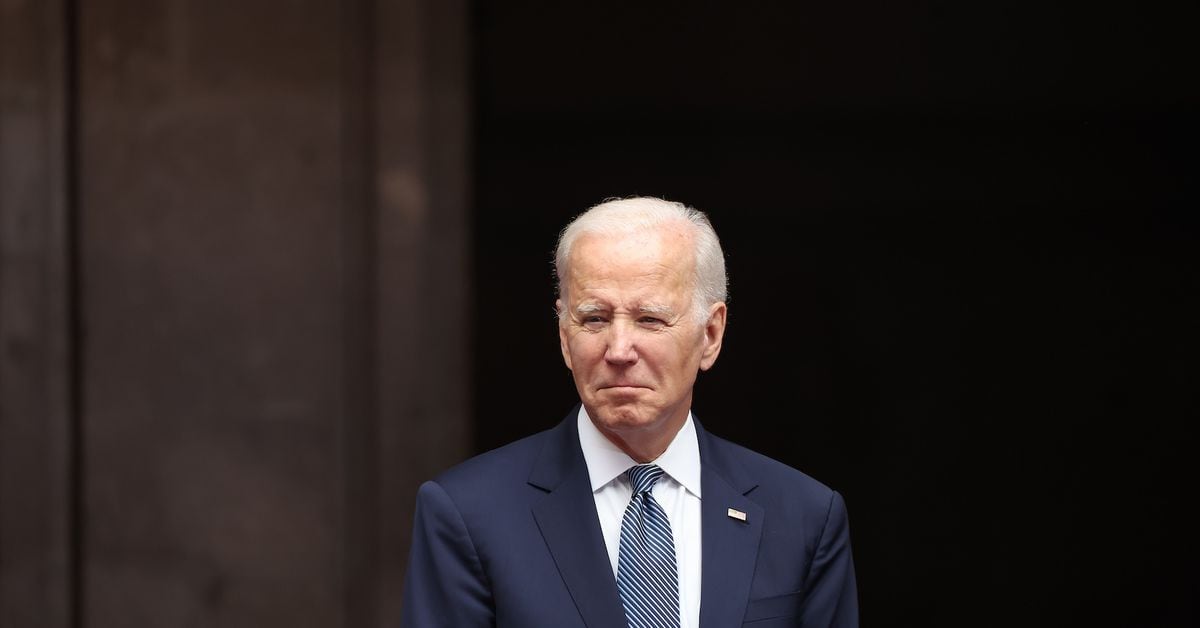This week in prediction markets:
Joe Biden likely will win the popular vote – but not the election, Polymarket prices signal.
The incumbent U.S. president isn’t accepting crypto donations (yet).
Barron Trump’s alleged involvement with the Martin Shkreli-backed DJT token is … a matter of debate.
Donald Trump is one of only five U.S. presidents who won the electoral college, and thus the nation’s highest office, despite losing the popular vote. If prediction markets are correct, he will repeat that feat this year.
On Polymarket’s contract asking who will win the popular vote, “yes” shares for President Joe Biden are trading at 56 cents, indicating the market sees a 56% chance of the incumbent prevailing. Each share pays out $1 (in the USDC stablecoin) if the prediction comes true, and zero if it does not.
Trump, meanwhile, has only a 36% chance of winning the popular vote, according to recent prices. Traders have bet $36 million on this question, making it Polymarket’s fourth-largest market by volume.
The largest by far, of course, is the one on who will win the presidency, with a record $182 million of bets placed. Here, Trump is the clear favorite, with a 57% chance of winning versus 35% for Biden.
Under a regulatory settlement, Polymarket blocks U.S. users, so its traders are presumably making predictions from afar. PredictIt, a more traditional U.S. election betting site that settles bets in dollars with a quasi-regulatory blessing, gives Trump a 52% chance of winning the presidency and Biden 47%. The volume there is comparatively small, though, at $15.7 million.
The Electoral College was conceived at the Constitutional Convention of 1787. It is designed to balance the influence of populous and less populous states, ensure smaller states have a voice in the election, and prevent a few large states from dominating the outcome. The popular vote, which carries no electoral weight, is simply the proportion of votes cast for each candidate.
The college consists of 538 electors. A majority of 270 electors’ votes is required to win the presidency. Each state has the same number of electors as it does members in its Congressional delegation: one for each member of the House of Representatives (the number of House members is proportional to a state’s population) plus two Senators.
Critics of this time-honored system call it undemocratic, while its defenders argue that it is a bulwark protecting the rights of the minority against potential tyranny of the majority. This much seems certain: If the Polymarket bettors are right and Trump does win the electoral college while losing the popular vote, “Not My President” rallies will be back in vogue.
Nearly two weeks after a report surfaced that Biden would follow Trump in accepting cryptocurrency donations, the president’s campaign still hasn’t done so, to the detriment of Polymarket traders who bet it would.
To be fair, the “Biden accepts crypto donations by Friday?” contract, which launched June 12, had a tight timeframe of nine days. The odds were as high as 48% early on but plummeted to zero. The market resolved to “no” on June 21, because the campaign had made no such announcement.
If Biden is weighing the option as claimed, it’s still possible an announcement could come later. That’s one of the risks of prediction markets: It’s possible to make a bet that’s directionally correct but still lose money because it didn’t come true within the agreed-upon timeframe.
Trump’s wholehearted embrace of crypto in May was followed by signs the Biden administration was softening its hardline stance against the industry, making plausible the scenario in which the incumbent would accept crypto donations.
Was Donald Trump’s son Barron really a part of the team behind the Solana-based DJT token that dominated crypto headlines and discourse last week?
A Polymarket contract on that mystery resolved to “no” on Sunday but that decision was disputed. It resolved again to “no” and was disputed a second time. A final review is ongoing. It is expected to be closed Tuesday.
Drama erupted on Monday in the Discord forum for UMA, the third-party oracle service responsible for refereeing bets on Polymarket. The forum was packed with “yes” shareholders making the case that their bet was correct.
At issue is whether “a preponderance of evidence suggests that Barron Trump was involved in the creation of the Solana token $DJT,” as spelled out in the Polymarket rules.
Neither the Trump campaign nor Barron have made any public statements about the matter, so those insisting the preponderance of the evidence suggests his involvement are relying largely on the word of Martin “Pharma Bro” Shkreli, who served six years in prison for securities fraud.
Shkreli said last week he created the token with Barron’s involvement following a contentious $100 million bet with popular crypto traders.
The relatively new token made waves in the community over its supposed status as the “official” Trump token, buoyed mainly by reports alleging Barron was part of the team. Pseudonymous promoters gushed that the token was going to billions of dollars in market cap, and prices rocketed thousands of percent in a week.
But radio silence from the Trump family soon caught on among followers. DJT prices have slumped more than 50% to 1 cent on Monday since a 3-cent peak on June 18.
With the review pending, Polymarket traders are giving the claim a 19% of being true as of U.S. morning hours on Monday, down from a peak of 60% when the market was created on June 21. It has clocked over $693,000 in volumes, making it Polymarket’s second-largest market on a crypto-related question.

![[Action required] Your RSS.app Trial has Expired.](https://8v.com/info/wp-content/uploads/2026/01/rss-app-cfAqZL-75x75.png)









![[Action required] Your RSS.app Trial has Expired.](https://8v.com/info/wp-content/uploads/2026/01/rss-app-cfAqZL-350x250.png)









